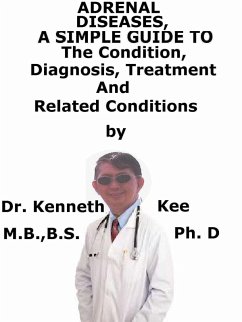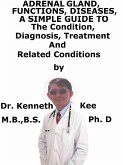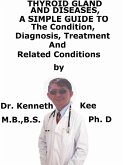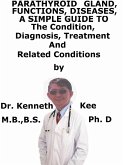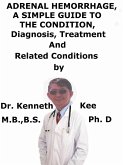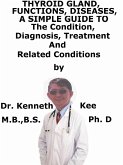The adrenal glands are endocrine glands that are located at the top of the kidneys.
In humans, the right adrenal gland has a triangular shape while the left adrenal gland has a semi lunar shape.
They are mainly accountable for releasing hormones in reaction to stress through the synthesis of corticosteroids such as cortisol and catecholamine such as epinephrine (adrenaline) and norepinephrine.
They also release androgens.
The adrenal glands can involve kidney function through the secretion of aldosterone, a hormone secreted in regulating the osmolarity of blood plasma.
Each adrenal gland has two distinct structures, the outer adrenal cortex and the inner medulla, both of which secrete hormones.
The cortex mainly secretes cortisol, aldosterone and androgens, while the medulla chiefly secretes epinephrine and norepinephrine.
Unlike the direct innervation of the medulla, the cortex is controlled by neuroendocrine hormones secreted from the pituitary gland which are regulated by the hypothalamus, and by the renin-angiotensin system.
Both of its regions are centers of formation of some vitally important hormones, having specific functions.
These powerful little endocrine glands produce and secrete steroid hormones such as cortisol, estrogen and testosterone that are necessary for life, health and vitality.
The adrenal glands have an important part in blood sugar metabolism and energy production.
Glucocorticoids are necessary to life and after removal of both adrenals humans will not live for long without glucocorticoid replacement.
Cortisol, an adrenal hormone, functions with insulin to maintain healthy levels of circulating glucose
Adrenal gland disorders happen when the adrenal glands do not function properly.
When the adrenal glands secrete too little or too many hormones, or when too many hormones come into the body from an outside source, serious health disorders can occur.
Overall, adrenal gland disorders are normally rare.
The number of people involved and at risk is dependent on the specific adrenal gland disorder.
These disorders can happen if there is a disorder with the adrenal gland itself, such as a disease, genetic mutation, tumor, or infection.
Occasionally the disorder occurs from a problem in another gland, such as the pituitary, which helps to control the adrenal gland.
Also, some medicines can produce problems with how the adrenal glands function.
1. Adrenal tumors produce symptoms because they cause the over- or under-production of certain hormones by the adrenal gland.
2. Hyperaldosteronism: the adrenal glands secrete too much aldosterone.
3. Pheochromocytoma: the adrenal glands release excessive amounts of catecholamines.
4. Cushing's syndrome: the adrenal glands form too much cortisol in the endogenous form.
5. Adrenal insufficiency indicates a group of diseases featured by underproduction of cortisol or aldosterone.
6. Addison's disease is a rare disorder in which the adrenal glands do not produce adequate amounts of glucocorticoids (mainly cortisol).
This can be induced by an autoimmune reaction, by some infections or by some other rarer causes.
7. Congenital adrenal hyperplasias are genetic defects of enzymes affected in cortisol production and can involve the sex characteristics of affected patients.
8. WaterhouseFriderichsen syndrome is adrenal gland failure because of bleeding into the adrenal glands, produced by severe bacterial infection.
The ACTH stimulation test may be done to diagnose some of these disorders
Adrenal fatigue occurs when the adrenal glands are overworked and depleted.
TABLE OF CONTENT
Introduction
Chapter 1 Adrenal Gland
Chapter 2 Diseases
Chapter 3 Pheochromocytoma
Chapter 4 Adrenal Cancer
Chapter 5 Cushing Syndrome
Chapter 6 ...
Dieser Download kann aus rechtlichen Gründen nur mit Rechnungsadresse in A, B, CY, CZ, D, DK, EW, E, FIN, F, GR, H, IRL, I, LT, L, LR, M, NL, PL, P, R, S, SLO, SK ausgeliefert werden.

